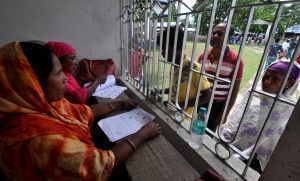The controversial National Register of Citizens (NRC) which was implemented in India’s border state of Assam continues to remain in limbo more than a year after it was completed. The behemoth exercise began in 2015 with the objective to compile a list of Indian citizens in Assam. It was deemed necessary as a measure to check the illegal influx of foreign nationals from Bangladesh into the state – something that has been a burning issue for many decades.
Close to 2 million people were left out of the list released last year on August 31 and who would now have to go through a judicial process to establish their citizenship. They would have to file claims with Foreigners Tribunals and appeals against verdicts can be made in the higher courts.
However, the process has remained stalled and further controversies triggered. The central Ministry of Home Affairs, which had carried out the exercise, is yet to issue official notifications on the NRC. People who have been deleted from the register (and therefore are deemed not to be Indian citizens) can approach the tribunals only after receiving the “rejection slip” from the NRC Secretariat that spells out the reasons for the deletion. That process is yet to be initiated, although media reports suggests it could begin next month.
In addition, the number of Foreigners Tribunals has not been expanded to expedite the settlement of claims anticipated to be filed by the people deleted from the list. Last year, 221 members were recruited and trained but they are yet to be given assignments in the Tribunals.
The NRC came into being in Assam in 1951. A landmark accord inked in 1985 between the All Assam Gaana Sangram Parishad, the All Assam Students Union, the state and central governments — which sought to end longstanding agitation and violence in the state — included a provision to update the NRC in order to identify foreign nationals living in the state. But it was only after the Supreme Court intervened on a Public Interest Litigation in 2013 that the process for the update of the register began in 2015. Close to 50,000 government employees were engaged in the exercise which cost the exchequer more than 12 billion Indian rupees.
The government is of the view that many foreign nationals have fraudulently managed to enroll their names in the NRC. In 2018, then state NRC coordinator Prateek Hajela, in a submission to the Indian Supreme Court, had alleged that some entries in the register were based on forged documents and therefore needed to be struck off – a proposition the top court rejected.
Some civil society organizations in Assam have also made a case for reverification of the register. The Assam government prefers a more selective review of the list with a greater focus in the border districts of the state.
The Citizenship (Amendment) Act passed last year by the Indian parliament has led to protests across India, including Assam, and have added to the NRC woes in the state. The cut-off date for citizenship under the act for non-Muslim immigrants from Pakistan, Afghanistan, and Bangladesh fleeing religious persecution is December 31, 2014. That means applicants seeking citizenship under the act should have entered India on or before that date. While in general, a minimum 12 year residence is required for Indian citizenship, the act reduces that to six years for non-Muslim immigrants from India’s Muslim-majority neighboring countries.
A fierce agitation swept through a vast swathe in Assam since this clause contravenes the NRC’s cut-off year of 1971 for determining citizenship. It could potentially entail granting of citizenship to a large section of non-Muslim foreign nationals in Assam changing the state’s demographic and cultural composition. The Indian government has exempted parts or whole of many Northeastern states from the purview of the Citizenship (Amendment) Act. A large part of Assam, however, remains within its ambit.
Rajeev Bhattacharyya is a senior journalist in Guwahati, Assam

































